Brake Caliper Lubricant extends brake life by properly lubricating all components and preventing breakdowns caused by brake dust buildup, squeaking, and heavy wear.
Brake caliper lubricants have different characteristics such as viscosity, noise and vibration reduction, service life, and compatibility with rubber, plastic, and metal.
Silicone Brake Grease
There are many pitfalls in brake work. One that is often overlooked is the selection and application of the correct Silicone Brake Grease.
In this review, we’ve compiled a list of the best brake caliper lubricants available on Amazon, as well as everything you need to know about proper brake lubrication.
Silicone Brake Grease | Comparison Table 2025
Top Quality | 5- Star Pick | Great Prices
| Preview | Product | Features | Price $$ |
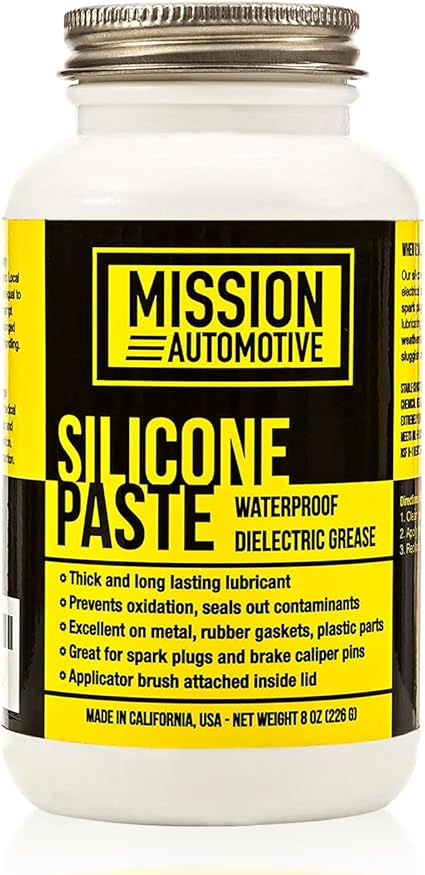 | Mission Automotive Dielectric Grease |
| view on Amazon |
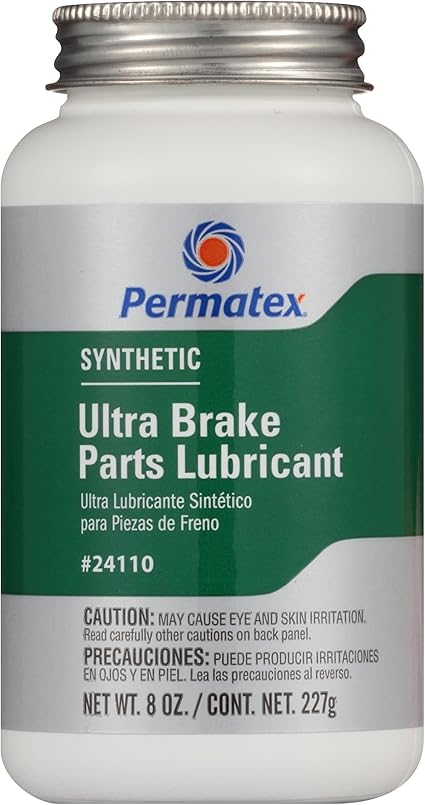 | PermatexUltra Disc Brake Caliper |
| view on Amazon |
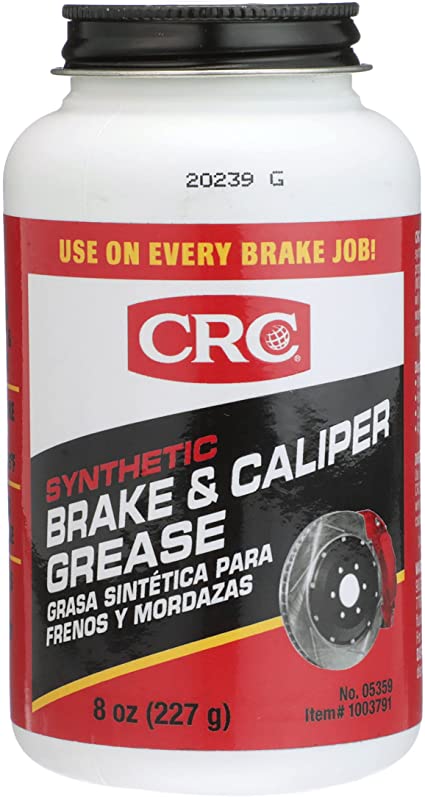 | CRC Brake Caliper Synthetic Grease |
| view on Amazon |
| AGS Brake Lubricant |
| view on Amazon | |
| CRC Silaramic Brake Grease |
| view on Amazon | |
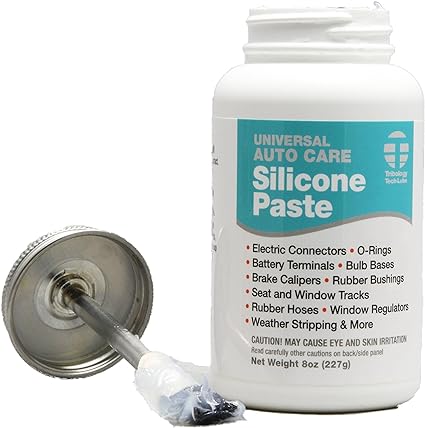 | Tribology Silicone Paste with Brush |
| view on Amazon |
| Genuine Volvo Brake Grease |
| view on Amazon | |
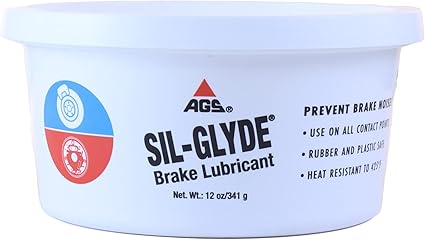 | SIL-Glyde Silicone Brake Grease |
| view on Amazon |
| Slipkote Silicone DBC Grease |
| view on Amazon |
Silicone Brake Grease | Reviews 2025
1. Mission Automotive Dielectric Best Silicone Brake Grease
This product is a high-quality dielectric grease that serves as a thick and long-lasting synthetic silicone lubricant. It effectively seals, protects, and prevents oxidation and corrosion, making it ideal for automotive, electrical, and marine applications. The grease is compatible with various materials, including metal, rubber, and plastic, and is particularly useful for tasks such as changing spark plugs, lubricating brake caliper pins, and preserving rubber gaskets.
The package includes an applicator brush for easy and precise application. Produced to industry standards, this silicone grease offers reliable performance in a wide range of temperatures.
Product Overview:
Mission Automotive Dielectric silicone brake grease is a thick, long-lasting lubricant made from synthetic silicone. It is resistant to temperature extremes, remaining stable at temperatures ranging from -55 to 570 degrees Fahrenheit. This makes it suitable for use in a variety of applications, including automotive, electrical, and marine.
[amazon fields=”B016E5E59G” value=”thumb” image_size=”large”]
[amazon fields=”B016E5E59G” value=”button”
One of the main benefits of dielectric grease is its ability to prevent oxidation and inhibit corrosion. It seals out contaminants such as salt and dirt, helping to protect metal, rubber, and plastic parts from deterioration. It is also useful for preventing voltage leaks around electrical connections.
Many common tasks can be aided by the use of marine greases, such as changing spark plugs, lubricating brake caliper pins, and preserving rubber gaskets, O-rings, hoses, and weatherstripping. It can also help fix sluggish car windows.
This product comes with an applicator brush attached to the inside of the lid at an angle, making it easy to apply the grease to the desired area. The product is clear or slightly milky-white in color. It is produced to the highest industry standards, ensuring top quality.
- Prevents oxidation and inhibits corrosion.
- Seals out contaminants such as salt and dirt.
- Stable at a wide range of temperatures.
- Compatible with a variety of materials.
- Comes with an applicator brush for ease of use.
- May not be suitable for use with certain materials, such as certain types of plastics.
- May not provide sufficient lubrication in certain applications.
- May become difficult to remove once applied.
2. Permatex 24110 Ultra Silicone Brake Grease
The product is a green, non-melting, environmentally-friendly synthetic lubricant designed for optimal performance under challenging brake conditions. Formulated to prevent seizing and sticking of disc brake components, it ensures critical metal-to-metal contact areas remain lubricated throughout the pad life.
With a temperature range of -40°F to 400°F (-40°C to 204°C), it is suitable for various applications such as caliper pins, hardware, and the back-side of brake pads. The lubricant effectively reduces the chance of brake chatter, sticking, and uneven wear, providing excellent performance when properly applied.
Product Overview:
Permatex Ultra Disc Brake Caliper Lube is a high-quality lubricant specifically formulated for use on disc brake systems. It is made from 100% synthetic materials and is designed to remain effective even under the most adverse brake conditions. This product is green, non-melting, and environmentally friendly. It is designed to prevent the seizing and sticking of disc brake components, ensuring that critical metal-to-metal contact areas remain lubricated throughout the life of the pads. It is also effective at reducing the chance of break chatter and preventing uneven wear.
[amazon fields="B000HBNV6W" value="thumb" image_size="large"]
[amazon fields="B000HBNV6W" value="button"
Permatex Ultra Disc Brake Caliper Lube is suitable for use on caliper pins, hardware, and the back side of brake pads. It has a wide temperature range, remaining effective from -40°F to 400°F (-40°C to 204°C). It is an excellent choice for anyone looking to maintain the performance and longevity of their disc brake system.
In addition to its effectiveness as a lubricant, Permatex is a well-respected brand known for its reliable and problem-solving solutions. From job-specific lubricants and protectants to heavy-duty needs, Permatex has a reputation for bringing customers products that extend the life of their equipment. If you are looking for a top-quality lubricant to keep your disc brake system functioning at its best, Permatex Ultra Disc Brake Caliper Lube is an excellent choice.
- Non-melting, environmentally-friendly formula
- Prevents seizing and sticking of disc brake components
- Lubricates under adverse conditions
- Keeps critical metal-to-metal contact areas lubricated
- Wide temperature range (-40°F to 400°F)
- May not be suitable for use on all brake components.
- May require frequent reapplication.
- Some users may prefer a different type of lubricant for their specific needs.
[amazon fields="B000M8PZGE" value="button"
One of the key benefits of this brake caliper grease is that it is resistant to moisture and will not wash out, which makes it ideal for use in wet or humid environments. It is also safe to use on plastic and rubber components, making it a versatile choice for a variety of different brake system applications.
This grease can be used on a variety of different metal-to-metal contact points and sliding surfaces within a brake system, including backing plates, brake pad contact points, caliper o-rings, calipers, disc brake pads, drum brake systems, grommets, parking brake areas of lubrication, pivot points, and self-adjusters. It is a dark gray color and comes in a convenient 8 oz bottle for easy application.
- Prevents caliper binding, vibration, and corrosion.
- Suitable for use in a wide temperature range (-40°F to 400°F).
- Resists moisture and will not wash out.
- Safe to use on plastic and rubber components.
- Suitable for use on a variety of different metal-to-metal contact points and sliding surfaces within a brake system.
- May not be compatible with all types of brake systems.
- May require frequent reapplication to maintain effectiveness.
- May not provide as much protection as some other types of brake system lubricants.
4. AGS SIL-Glyde 4 oz Tube Silicone
Sil-Glyde Brake Lubricant is a silicone-based brake lubricant designed for the entire brake assembly, compatible with plastic and rubber components (EPDM & Nitrile). The lubricant ensures a noise-free brake installation and facilitates easy disassembly. It effectively eliminates disc brake squeal, protecting against corrosion and rust, while also dampening vibrations between contact points.
With a moisture-proof and heat-resistant formula, it can withstand temperatures over 425°F (218°C). The product comes in a convenient 4 oz tube, making application precise and easy. AGS brake lubricant is crucial for preventing disc brake squeal and maintaining the longevity of brake components. Recommended for its versatility, it is a reliable choice for brake maintenance and protection.
Product Overview:
AGS SIL-Glyde Brake Lubricant is a silicone-based product designed to be used in the entire brake assembly of a vehicle. It is compatible with both plastic and rubber components, including EPDM and Nitrile. This lubricant is formulated to eliminate disc brake squeal, protect against rust and corrosion, and dampen vibrations between contact points in the brake system.
[amazon fields="B000CIHTPE" value="thumb" image_size="large"]
[amazon fields="B000CIHTPE" value="button"
One of the key features of AGS SIL-Glyde Brake Lubricant is its ability to resist moisture and heat. It is resistant to temperatures of up to 425°F (218°C), making it suitable for use in a variety of environments and conditions. It is also moisture-proof, helping to prevent rust and corrosion in wet or humid conditions.
In addition to its performance benefits, AGS SIL-Glyde Brake Lubricant is easy to apply and use. It comes in a convenient 4 oz tube and can be easily applied to the brake assembly using the included nozzle. It is recommended for use during brake installation to ensure a noise-free operation, and can also be used to facilitate easy disassembly of brake components.
- Eliminates disc brake squeal.
- Protects against rust and corrosion.
- Dampens vibrations between contact points.
- Resistant to moisture and heat.
- Easy to apply and use.
- May not be compatible with all brake systems.
- May need to be reapplied periodically.
- May not be as effective in extreme temperature conditions.
5. CRC 05361 Silaramic Brake System Grease
The product is a high-performance synthetic brake lubricant designed to protect all moving caliper hardware, mating surfaces, and backing plates. Formulated with the latest rust, oxidation, and anti-wear additives, it offers lasting protection against friction, wear, and corrosion. Ideal for both regular and racing applications, this lubricant works effectively in extreme temperature ranges from -50 to 3000°F.
It features a synthetic, dry-film, ceramic formula that reduces brake noise and vibrations by dampening all brake vibrating frequencies. The lubricant will not run off or wash out, providing durable and consistent performance. With a focus on enhancing braking system longevity.
Product Overview:
CRC Silaramic Brake Grease is a high-performance lubricant designed for use in brake systems and components. It is formulated with synthetic, dry-film ceramic technology that helps to reduce brake noise and vibrations by dampening vibrating frequencies. This grease is suitable for use in a wide range of temperatures, from -50 to 3000°F, making it suitable for use in a variety of applications and environments.
[amazon fields="B0091KCG0W" value="thumb" image_size="large"]
[amazon fields="B0091KCG0W" value="button"
One of the key benefits of this grease is its ability to protect against friction, wear, and corrosion. It contains rust, oxidation, and anti-wear additives that help to extend the lifespan of brake hardware and improve overall performance. It is also effective at protecting against uneven pad wear, which can lead to uneven braking and decreased safety.
In addition to its performance benefits, this grease is also easy to use. It can be applied to all brake systems and components, including calipers, bushings, holes, pins, inserts, anchors, bolts, calipers, and boots. It is a dry-film lubricant that will not run off or wash out, making it easy to apply and ensuring that it stays in place during use.
- Protects against friction, wear, and corrosion.
- Reduces brake noise and vibrations.
- Suitable for use in a wide range of temperatures.
- Easy to apply and does not run off or wash out.
- Can be used on all brake systems and components.
- May be more expensive than some other brake lubricants.
- May not be as effective at reducing brake noise and vibrations as some other lubricants.
- May not provide as much protection against wear and corrosion as some other lubricants.
6. Tech-Lube Universal Auto Care Silicone Paste
The product is a versatile and clear non-melting paste designed for various automotive applications. It serves as a protective coating against surface oxidation, ideal for battery terminals, electric connectors, O-rings, brake calipers, and more. The paste also reconditions rubber and plastic, eliminating squeaks and providing extended protection on plastic, rubber, and metal surfaces throughout the vehicle.
With a clear (invisible) coating, it ensures long-lasting lubrication. The product comes with a permanently attached applicator brush for easy and precise application, maximizing the discharge of the paste. Boasting high dielectric strength, it is suitable for a range of uses, including marine applications. The 10-line summary emphasizes its multi-purpose nature, protective qualities, and efficient applicator design, making it a valuable addition to automotive maintenance.
Product Overview:
Tech-Lube TSG Universal Auto Care Silicone Paste is a multi-purpose lubricant and protectant with high dielectric strength. It is a clear, non-melting paste that is totally water-resistant. This product is ideal for use on various surfaces throughout a vehicle, including electric connectors, O-rings, battery terminals, bulb bases, weather stripping, seat and window tracks, rubber bushings, brake calipers, rubber hoses, window regulators, wire terminals, distributor cap terminals. It can also be used in marine applications.
[amazon fields="B077PD43P8" value="thumb" image_size="large"]
[amazon fields="B077PD43P8" value="button"
This silicone paste reconditions rubber and plastic, eliminating squeaks and protecting against surface oxidation. It has excellent thermal oxidation protection and is a non-hardening compound that seals and lubricates for long-term protection. Tech-Lube TSG Universal Auto Care Silicone Paste is odorless and can be used on all types of plastic, rubber, and metal surfaces.
This silicone paste comes with a permanently attached applicator brush that has been extended to maximize the total discharge of the product. This makes it easy to apply the silicone paste to the desired surfaces. Overall, Tech-Lube TSG Universal Auto Care Silicone Paste is a versatile and effective product that can help to extend the life of various components in a vehicle and improve their performance.
- Multi-purpose lubricant and protectant.
- High dielectric strength.
- Protects against surface oxidation.
- Reconditions rubber and plastic.
- Eliminates squeaks.
- Not specifically formulated for any one type of surface or application.
- May not provide as much protection or lubrication as specialized products.
- May be more expensive than some alternative products.
7. Genuine Volvo Silicone Brake Pad Grease
The Genuine Volvo is a high-quality white silicone grease formulated with a special silicon oil blend, featuring excellent EP (extreme pressure) properties and remarkably low friction. Its composition includes effective white solid lubricants, ensuring optimal performance. This silicone grease exhibits a broad temperature range, impressive water resistance, and resistance to oxidation and aging.
Designed for use between various material combinations such as plastic, metal, and rubber, it proves versatile in lubrication applications. With a dripping point exceeding +250 °C and a temperature range spanning from -50 °C to +200 °C, it offers reliability in diverse conditions. The product's density is measured at 1 g/cm³, and it is silicone-based. A reliable choice for ensuring smooth operations.
Product Overview:
The Genuine Volvo Silicone Brake Pad Grease is a high-quality lubricant that is specially formulated for use in a variety of automotive and marine applications. It is made from a white silicone grease that is based on a special silicon oil and contains a combination of solid lubricants that give it excellent EP (extreme pressure) properties and extremely low friction.
[amazon fields="B00W4DI0AI" value="thumb" image_size="large"]
[amazon fields="B00W4DI0AI" value="button"
The grease is able to withstand a wide temperature range, from -50°C to +200°C, and has good water resistance and resistance to oxidation and aging. This makes it suitable for use in a variety of different conditions and environments.
The grease is also effective at lubricating between all combinations of plastic, metal, and rubber, making it a versatile and reliable choice for a range of applications. It has a density of 1 g/cm³ and a dripping point of over +250°C. It comes in a convenient container with a permanently attached applicator brush that has been extended to ensure maximum product discharge.
- High-quality and reliable performance
- Wide temperature range and good resistance to water, oxidation, and aging
- Suitable for lubricating between all combinations of plastic, metal, and rubber
- Permanently attached applicator brush for easy application
- High dielectric strength
- May be more expensive than some other lubricants on the market
- May not be suitable for use in extremely high-temperature environments
- May not be effective at lubricating certain types of surfaces or materials.
8. AGS SIL-Glyde 12 oz Tub Silicone Based Brake
Sil-Glyde Brake Lubricant is a versatile silicone-based lubricant designed for various automotive applications. With compatibility with plastic and rubber, it effectively dampens vibrations between contact points. Resistant to moisture and heat up to 425°F (218°C), it provides reliable protection against resistance and wear. It offers a reliable solution for maintaining and protecting various vehicle parts.
The 12 oz tub is ideal for applications on rubber, metal, wood, glass, and plastic, without causing harm to surfaces. Suggested uses include trunk seals, rubber bumpers, speedometer cables, brake parts, window channels, hood strips, pads, rubber gaskets, and belts. The product ensures long-lasting performance and is known for its effectiveness in reducing friction and preventing wear in critical automotive components.
Product Overview:
AGS Sil-Glyde Brake Lubricant is a silicone-based lubricant specifically designed for use on brake assembly parts. It is formulated to eliminate squeals caused by vibration between contact points, and it is moisture-proof and heat-resistant up to 425°F (218°C). This lubricant also protects against rust, corrosion, and wear, making it an excellent choice for extending the lifespan of your brake components.
[amazon fields="B000CIFUKA" value="thumb" image_size="large"]
[amazon fields="B000CIFUKA" value="button"
One of the key features of Sil-Glyde Brake Lubricant is its compatibility with a wide range of materials, including rubber, metal, wood, glass, and plastic. This makes it a versatile choice for use on a variety of automotive parts, such as trunk seals, rubber bumpers, speedometer cables, window channels, hood strips and pads, rubber gaskets, and belts.
In addition to its protective properties, Sil-Glyde Brake Lubricant is also safe to use on car finishes, making it a convenient choice for those looking to maintain their vehicle's appearance. The lubricant comes in a convenient 12 oz tub, making it easy to apply to the desired parts.
- Eliminates brake squeals caused by vibration between contact points.
- Moisture-proof and heat-resistant up to 425°F (218°C).
- Protects against rust, corrosion, and wear.
- Compatible with a wide range of materials, including rubber, metal, wood, glass, and plastic.
- Safe to use on car finishes.
- May not be effective in extreme temperatures.
- May not provide as much protection as other lubricants.
- Some users may not like the silicone-based formula.
9. Slipkote 220-R Silicone DBC Grease
The Slipkote 220-R grease is a versatile silicone lubricant designed for disc brake caliper assemblies. It addresses common issues such as wear and corrosion in moving caliper hardware, backing plates, and seals. With a shear stable thickener, it ensures maximum protection across a broad temperature range from -50°F to 550°F (-45°C to 287.8°C). The non-melting formula, coupled with high dielectric strength and low volatility, offers durability and resilience.
It is insoluble in various substances, including water, brake fluids, and chemicals, enhancing its reliability. Compatibility with plastics and rubbers, particularly ethylene propylene terpolymer (EPDM, EPT), is highlighted. The lubricant boasts features like rust and corrosion prevention, waterproofing, wear reduction, and chemical resistance.
Product Overview:
SLIPKOTE 220-R SILICONE DISC BRAKE CALIPER GREASE is a high-performance lubricant specifically designed for use in disc brake caliper systems. It is formulated with a shear-stable thickener and an additive package that protects against wear, oxidation, rust, and corrosion.
[amazon fields="B07HBD7LSC" value="thumb" image_size="large"]
[amazon fields="B07HBD7LSC" value="button"
This silicone grease is non-melting and has a wide temperature range of -50°F to 550°F (-45°C to 287.8°C). It is also highly resistant to water, methanol, ethanol, dilute acids, caustics, glycol, glycerine, mineral oils, and brake fluids. It is compatible with most plastics and rubbers, particularly ethylene propylene terpolymer (EPDM, EPT).
In addition to its use in disc brake caliper systems, this grease can also be used in a variety of automotive, marine, agricultural, electrical, industrial, and household applications. It is effective at reducing wear, preventing rust and corrosion, and providing waterproofing. It also has a high dielectric strength and is resistant to chemical breakdown. Overall, SLIPKOTE 220-R SILICONE DISC BRAKE CALIPER GREASE is a versatile and reliable lubricant that is capable of performing well in a wide range of applications and environments.
- Provides protection against wear, oxidation, rust, and corrosion.
- Non-melting with a wide temperature range.
- Highly resistant to water, methanol, ethanol, dilute acids, caustics, glycol, glycerine, mineral oils, and brake fluids.
- Compatible with most plastics and rubbers, particularly EPDM and EPT.
- Reduces wear, prevents rust and corrosion, and provides waterproofing.
- May not be suitable for use in certain extreme temperature conditions.
- May not be compatible with all types of plastics and rubbers.
- May not provide the same level of performance as other specialized lubricants.
Advantages of Brake Caliper Grease
Lubricants. Properly lubricated brake components work better. Calipers and wheel cylinders are a complex series of internal moving parts, including but not limited to caliper pins, bushings, and slides. All of these mechanisms must be lubricated for optimal sliding of the pads within the caliper housing.
Reduction of Vibration and Noise Brake caliper grease is effective in reducing vibration and noise generated by the caliper pistons and disc brake pads. Repeated hard braking can cause excessive friction and, over time, squeal. Lubricating the area where the caliper makes contact with the brake pads can eliminate these symptoms.
Types of Grease for Brake Calipers
Mineral oil-based grease
Petroleum-based products are the base for mineral oil-based formulations. They may or may not be mixed with additives to improve viscosity, consistency, and working temperature. In general, petroleum-based brake caliper greases perform poorly in high-temperature, high-torque applications. As a result, they are less safe for wheel bearings than silicone or synthetic greases.
Note: Mineral oil-based greases are noisier than standard/synthetic greases in high-speed applications.
Synthetic grease
Think of synthetic grease as the wild card in brake caliper grease. Synthetic greases come in a variety of formulations with different viscosities, additives, moisture resistance, and extreme operating temperature ranges. For example, some synthetic greases use lithium, calcium, or additives to improve working temperatures.
Many synthetic greases are also silicone-based, unlike conventional petroleum- or mineral oil-based greases.
Silicone Greases
Silicone grease is a highly versatile grease known for its high viscosity, consistency, and extremely wide operating temperature range. Unlike oil-based greases, it is safe for rubber, metal, wood, glass, and other braking materials.
Brake Caliper Grease Price
Under $30.00. Brake caliper grease under $30.00 is in the low-price category. They are generally classified by size. Expect mineral oil-based grease, not synthetic or silicone-based grease, in containers of 250 ml or less.
$30 to $50 This price range provides improved extreme working temperatures, high viscosity, and synthetic/silicone grease compared to weaker mineral oil-based greases.
Note that mineral oil-based greases (composed of petroleum-based chemicals and additives) are less effective on rubber parts and wash out more easily, while silicone and synthetic greases are more expensive.
50 and up Brake caliper greases in this price range generally have larger container sizes; expect 20 oz. or larger containers with the same formulation as products in the $30 to $50 price range.
Key Features To Consider while choosing the Silicone Brake Grease
Here are some important features to look for when searching for brake caliper grease.
Viscosity
Viscosity refers to thickness. The higher the viscosity, the greater the protection against friction and the adhesive force that keeps the compound on the lubricated parts for a longer period of time. This concept applies to all parts, including O-rings, calipers, disc brake pads, and automatic adjusters.
Operating Temperature
The best caliper greases can withstand extreme operating temperatures due to the excessive heat generated by the friction caused by metal-to-metal contact between calipers and brake pads. Some lower quality brake caliper greases can break down under heat. We recommend caliper greases made of silicone and PFPE, which can withstand temperatures from -40 to 392°C (-40 to 392°F). Polyglycerol follows suit, effective at temperatures from -40 to 257 degrees Fahrenheit; avoid PAOIs and ester-based formulations.
Classification
Please note the certification of brake caliper grease. There are two types of grease formulations, which are classified as all-purpose grease (AP grease) and multi-purpose grease. The difference between the two lies in stability and durability against large pressures. All-purpose grease has a higher operating temperature, higher viscosity, and better overall performance than lightweight multipurpose grease.
Compatibility
Please note that some components of brake caliper grease may not be compatible with your brake pads. For example, PAO and ester-based lubricants are known to attack plastics, while silicone and PFPE-based formulations are compatible with plastics. If in doubt, choose silicone-based brake caliper grease.
Application Method
Many brake caliper greases come with brushes. Look carefully to see if it is an angled brush or a straight brush. Some users choose one over the other because of comfort during application.
Water Resistance
Look carefully at the waterproof performance. Waterproof lubricants tend to keep out moisture, thus preventing rust and corrosion.
How to apply Silicone Brake Grease | Video Explanation
Silicone Brake Grease | Infographic
Frequently Asked Questions
Is Silicone Grease Good For Brakes?
Yes, silicone grease can be used on brake systems. It is a good choice for lubricating brake components because it is resistant to high temperatures and does not easily break down or evaporate. However, it is important to use high-quality silicone grease specifically designed for brake systems, as some types of silicone grease may not meet the performance and safety standards required for brakes.
In general, it is a good idea to use a lubricant that is specifically designed for brake systems on any components that come into contact with the brake pads or brake fluid. This includes the brake caliper slides, the brake pad backing plates, and the brake pad pins. Using the wrong type of lubricant, or using a lubricant that is not compatible with the brake system, can cause problems such as increased brake pedal effort, reduced brake effectiveness, or even brake failure.
It is also important to follow the manufacturer's recommendations for lubricating brake components, as different brake systems may have different requirements. If you are not sure which lubricant to use, or if you have any questions about maintaining your brakes, it is always best to consult a professional mechanic or the vehicle's owner's manual.
Is Silicone Grease The Same As Brake Grease?
Silicone grease and brake grease are similar in that they are both types of lubricants that can be used on brake systems. However, they are not the same thing and have some differences in their properties and uses.
Silicone grease is a lubricant made from silicone oil and a thickening agent. It is resistant to high temperatures and does not easily break down or evaporate, making it a good choice for lubricating brake components that may be exposed to high temperatures or brake fluid. However, not all silicone greases are suitable for use on brake systems, and it is important to use a high-quality silicone grease specifically designed for brake systems to ensure proper performance and safety.
Brake grease, on the other hand, is a lubricant specifically designed for use on brake systems. It is formulated to meet the performance and safety standards required for brakes and may have additional properties such as corrosion resistance and compatibility with brake fluids. Brake grease is typically recommended for use on brake components that come into contact with the brake pads or brake fluid, such as the brake caliper slides, brake pad backing plates, and brake pad pins.
In general, it is a good idea to use a lubricant that is specifically designed for brake systems on any components of the brake system. This will help to ensure proper performance and safety and may help to extend the life of the brakes. If you are not sure which lubricant to use, or if you have any questions about maintaining your brakes, it is always best to consult a professional mechanic or the vehicle's owner's manual.
Where Do You Put Silicone On Brake Pads?
Silicone grease can be used on brake pads to lubricate the brake pad pins or shims, which are small metal rods or plates that are used to hold the brake pads in place and help to reduce noise and vibration. To apply silicone grease to the brake pads, follow these steps:
- Clean the brake pads: Use a brake cleaner or degreaser to remove any dirt, grime, or old lubricant from the brake pads. This will help the silicone grease to bond better with the pads and prevent contamination of the brake system.
- Locate the brake pad pins or shims: Look for the small metal rods or plates that hold the brake pads in place. These are typically located on the back of the brake pads.
- Apply the silicone grease: Using a clean, lint-free cloth or a silicone grease applicator, apply a thin layer of silicone grease to the brake pad pins or shims. Be sure to coat the entire surface of the pins or shims, but do not use too much grease as it can cause the pads to become oversaturated and create excess brake dust.
- Reinstall the brake pads: Once the silicone grease has been applied, carefully place the brake pads back into the brake caliper and secure them in place using the brake pad pins or shims. Be sure to follow the manufacturer's instructions for the proper installation of the brake pads.
It is important to note that silicone grease should only be used on the brake pad pins or shims, and not on the brake pads themselves. Applying silicone grease directly to the brake pads can cause problems such as reduced brake effectiveness and increased brake pedal effort. If you are not sure which parts of the brake system to lubricate, or if you have any questions about maintaining your brakes, it is always best to consult a professional mechanic or the vehicle's owner's manual.
Is Silicone Brake Fluid Corrosive?
Silicone brake fluid is a type of brake fluid that is made from silicone oil, rather than the mineral oil or glycol-based fluids used in most conventional brake systems. Silicone brake fluid is known for its high-temperature stability and resistance to corrosion, making it a popular choice for use in racing and high-performance vehicles.
In general, silicone brake fluid is not considered to be corrosive, as it does not contain the water-absorbing properties or chemical additives found in conventional brake fluids that can cause corrosion in some brake systems. However, it is important to note that silicone brake fluid is not compatible with most conventional brake systems, and cannot be mixed with other types of brake fluid.
Using silicone brake fluid in a brake system that is not designed for it can cause problems such as reduced brake effectiveness, increased brake pedal effort, and brake system failure. It is always important to use the correct type of brake fluid for your vehicle and to follow the manufacturer's recommendations for maintaining your brake system. If you are not sure which type of brake fluid to use, or if you have any questions about maintaining your brakes, it is always best to consult a professional mechanic or the vehicle's owner's manual.
Is Lithium Grease Ok For Brakes?
Lithium grease can be used on some brake components, but it is not typically recommended for use on brake systems. While lithium grease is a good lubricant for many applications, it is not as well-suited for use on brake systems as other types of lubricants such as silicone grease or brake grease.
Lithium grease is a type of grease that is made from a lithium soap base and a mineral oil carrier. It is known for its high-temperature stability and ability to resist water wash-out, making it a good choice for use in high-stress environments such as bearings and gears. However, it is not as resistant to high temperatures as silicone grease, and may not meet the performance and safety standards required for use on brake systems.
In general, it is a good idea to use a lubricant that is specifically designed for brake systems on any components that come into contact with the brake pads or brake fluid. This includes the brake caliper slides, the brake pad backing plates, and the brake pad pins. Using the wrong type of lubricant, or using a lubricant that is not compatible with the brake system, can cause problems such as increased brake pedal effort, reduced brake effectiveness, or even brake failure.
It is also important to follow the manufacturer's recommendations for lubricating brake components, as different brake systems may have different requirements. If you are not sure which lubricant to use, or if you have any questions about maintaining your brakes, it is always best to consult a professional mechanic or the vehicle's owner's manual.
Should You Grease Brake Caliper Bolts?
It is generally not necessary to lubricate brake caliper bolts, as they are typically coated with a corrosion-resistant finish and do not require regular lubrication. However, it may be necessary to lubricate the threads of the caliper bolts if they become seized or difficult to remove.
If you need to lubricate the threads of the caliper bolts, it is important to use a lubricant that is compatible with the brake system and will not cause damage or corrosion. A high-quality silicone grease or brake grease is typically a good choice for this purpose.
To lubricate the threads of the caliper bolts, follow these steps:
- Clean the caliper bolts: Use a brake cleaner or degreaser to remove any dirt, grime, or old lubricant from the caliper bolts. This will help the lubricant to bond better with the bolts and prevent contamination of the brake system.
- Apply the lubricant: Using a clean, lint-free cloth or a silicone grease applicator, apply a thin layer of lubricant to the threads of the caliper bolts. Be sure to coat the entire surface of the threads, but do not use too much lubricant as it can cause the bolts to become oversaturated and create excess brake dust.
- Reinstall the caliper: Once the lubricant has been applied, carefully place the caliper back onto the brake caliper mounting bracket and secure it in place using the caliper bolts. Be sure to follow the manufacturer's instructions for proper installation of the caliper, and use the proper torque specification when tightening the bolts.
It is important to note that lubricating the threads of the caliper bolts should only be done if the bolts are seized or difficult to remove. Overlubricating the caliper bolts can cause problems such as increased brake pedal effort, reduced brake effectiveness, or even brake failure. If you are not sure which parts of the brake system to lubricate, or if you have any questions about maintaining your brakes, it is always best to consult a professional mechanic or the vehicle's owner's manual.
Is Ceramic Grease Good For Brakes?
Ceramic grease is a type of lubricant that is made from ceramic particles suspended in a silicone or synthetic oil base. It is known for its high-temperature stability and ability to reduce friction, making it a good choice for use in high-stress environments such as bearings and gears.
While ceramic grease may be suitable for use on some brake components, it is generally not recommended for use on brake systems. This is because ceramic grease is not as resistant to high temperatures and brake fluid as other types of lubricants such as silicone grease or brake grease, and may not meet the performance and safety standards required for brakes.
In general, it is a good idea to use a lubricant that is specifically designed for brake systems on any components that come into contact with the brake pads or brake fluid. This includes the brake caliper slides, the brake pad backing plates, and the brake pad pins. Using the wrong type of lubricant, or using a lubricant that is not compatible with the brake system, can cause problems such as increased brake pedal effort, reduced brake effectiveness, or even brake failure.
How Do I Lubricate Brake Calipers?
First, remove rust from the caliper bracket with a wire brush or similar tool. Clean or replace hardware and lubricate all friction points between metal and rubber.
Can I Use Regular Brake Grease?
A: No. Car brakes can get very hot, especially when braking hard or repeatedly. Some general-purpose lubricants are not designed to withstand these conditions. You need high-temperature grease that can withstand the heat and not damage rubber or plastic parts.
Can I Use Lithium Grease On Brake Calipers?
A: No. White lithium can be used for drum brake fittings and backing plates, but it is a low-temperature grease and should not be used for front disc brakes.
What Grease Should I Use For Brake Calipers?
The best brake calipers we recommend vary in price, consistency, noise and vibration reduction, operating range, and compatibility with rubber, plastic, and metal. The best recommendation is Mission Automotive's dielectric grease/silicone paste/waterproof marine grease, which is ideal for brake caliper pins, O-rings, rubber seals, steering rings, and all types of brake materials including attached brushes, silicone base, metal, rubber, and plastic It can be used safely.
What Happens If I Don't Grease The Caliper Pins?
If caliper pins are not greased, they can become worn over time, causing uneven wear of brake pads, poor contact between brakes and rotors, and excessive heat generation due to the sticking of sliding pins. Excessive brake dust can also build up.
It is strongly recommended that caliper sliding pins be lubricated at least twice a year or depending on driving conditions. Drivers who drive in cold weather may benefit from more frequent lubrication.
Final Thoughts
The best brake caliper grease we chose was Mission Automotive's dielectric/silicone paste/waterproof marine grease. It is waterproof and seals and protects various components such as brake caliper pins.

Hi, I am David Bailey a dedicated writer from Linden Bridge School with a degree in mechanical engineering and a degree in marketing. I strive to simplify complex subjects and like to explain complex and technical matters in an easy-to-understand manner. Read More Here
